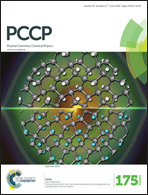Design of spin-forbidden transitions for polypyridyl metal complexes by time-dependent density functional theory including spin–orbit interaction†
Abstract
We explore spin-forbidden transitions for a Ru dye with an N3 skeleton and an Fe dye with a DX1 skeleton by time-dependent density functional theory with spin–orbit interaction. The modified N3-based Ru dye with iodine anions has an absorption edge in the long wavelength region which is not observed in the original N3 dye. The long wavelength absorption edge originates from the spin–orbit interaction with iodine. Although the Fe dye has a small spin–orbit interaction, because of less spin–orbit interaction from the light metal, spin-forbidden transitions also occur for DX1-based Fe dye systems with iodine anions. This result indicates that the introduction of iodine can strengthen the spin–orbit interaction for a dye sensitizer and offers a new approach for designing spin-forbidden transitions.


 Please wait while we load your content...
Please wait while we load your content...